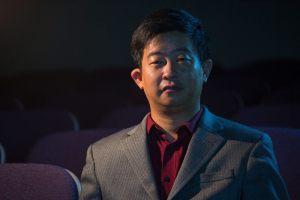Zhu Han, UH professor of electrical and computer engineering, recently earned two unrelated grants from the National Science Foundation.
He first received $250,000, a portion of a half-million dollar grant shared with Denver University, to research Proactive Recovery of Electric Power Assets for Resiliency Enhancement, or PREPARE. The foundation later awarded him $140,000 to enhance software-defined network planning and administration of wireless cellular infrastructure.
With additional support from CenterPoint Energy, the goal of Han’s first project is to minimize electrical power grid disruption caused by hurricanes by developing protection for critical infrastructure and determining optimal allocation of limited electrical power and workforce resources. To recover power as quickly and cost effectively as possible, Han and his team are formulating algorithms and models to predict storm damage to electrical power systems, to determine sufficient equipment purchases and to optimize crew mobilization.
“Improved local and national energy security, reliability and sustainability will lessen the destruction caused by extreme weather and other natural disasters, which will save billions of dollars,” Han said. “In addition to scientific and technological advancements, the project will outline outreach activities to educate academia and industry representatives as well as the general public.”
In collaboration with Arizona State University, Finland’s University of Oulu and VTT Technical Research Centre of Finland, Han’s second research project aims to realize efficiencies for the dense and heterogeneous software-defined cellular network to improve user experiences. The software-defined network provides opportunities for dynamics and layers at the edge, or user access points, which were not available with the original, flat version of the radio access network. Han plans to dynamically optimize cellular network performance with resource allocation for hierarchal structures.
“It’s routing cellular signals to servers in different network layers, similar to the concept of optimizing traffic on highway ramps,” Han said. “We are concentrating on the consumption-based, human-machine interface.”
The project involves network architecture design, theoretical modeling and analysis, and experimental simulations to quantify performance benefits, Han said. The research addresses challenges that include coexistence of interfering mobile clusters and elastic resource allocation in novel frameworks, he added.
“The intellectual merit originates from the interdisciplinary fusion of different technologies including software-defined radio and networking, wireless communications, machine learning and game theory,” Han said. “The proposed scheme offers reduced overhead control and system latency through exploration of locality, which enhances system scalability.”
The research project enriches game theory curriculum at the involved universities and strengthens wireless research communication collaborations between the United States and Finland, Han said. Han also plans to engage minority and underrepresented students and to promote science and engineering among K-12 students with this venture.
Both National Science Foundation grants continue through 2017.
